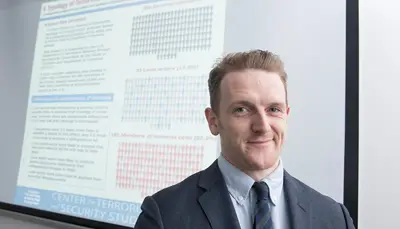Lisa Thompson Researches Decision-making and Criminal Behavior
 Image by Courtesy
Image by Courtesy
06/09/2020
By Katharine Webster
Criminology Ph.D. student Lisa Thompson has won a rare opportunity to do research at the National Institute of Justice in Washington, D.C., for a year, starting in September.
Only three graduate students were awarded research assistantships this year at the NIJ, a federal agency that researches crime and develops and evaluates prevention strategies. Thompson, the first UMass Lowell student to win an NIJ research assistantship, says she’s looking forward to working on a range of criminal justice questions.
“I’m excited to engage in all different types of research and work with larger research groups than I’m used to,” she says. “The idea of the fellowship is to experience what a government job in criminal justice research would be like, compared to other jobs in the field.”
Thompson will also pursue her dissertation research on how people make the decisions that lead them into criminal behavior, how different personality traits and values contribute to those decisions, and how people can learn to make better decisions.
She is advised by Asst. Prof. Neil Shortland, who just won a National Science Foundation CAREER grant to expand his research into how soldiers, first responders and others make critical decisions in situations that call for a rapid choice between two equally bad or uncertain alternatives, known as “least-worst decision-making.”
Thompson earned her undergraduate and master’s degrees in psychology, but always had a strong interest in quantitative research into psychopathology and criminal psychology. While researching sexual violence and sex offenders as a master’s student at Brandeis University, she met Prof. of Criminology Andrew Harris, then associate dean of the College of Fine Arts, Humanities and Social Sciences, at a research conference.
Harris invited her to apply to UMass Lowell’s Ph.D. programs in psychology and criminology. He explained that the School of Criminology and Justice Studies has a cluster of faculty, including him, who specialize in sex offender policy and prevention research.
The deadline for the Ph.D. program in applied psychology and prevention science had passed – but the deadline for the Ph.D. program in criminology had not. Thompson was accepted, decided the program was a great fit, and began working as a teaching assistant while taking classes.
More than a year into her coursework, Thompson went to a discussion for first- and second-year Ph.D. students about their research interests. Upon hearing about Thompson’s background in psychology, Shortland, a forensic psychologist by training, said, “We should talk. I need a psychologist.”
Thompson began working with Shortland on his least-worst decision-making research and the simulation tool he has developed to conduct it. She soon realized that the simulation tool could be adapted for research into how people make decisions that lead them to commit crimes.
Such cognitive methods aren’t generally used in the field of criminology, but could contribute to a better understanding of criminal behavior, she says.
“I’m trying to introduce new questions and methods that might be more effective in understanding offender decision-making,” she says. “I want to understand the cognitive steps people take in making a decision and then add in the component of, ‘What decision are you making that leads you to a socially and legally sanctioned outcome or an illegal outcome that carries a high risk of violence or incarceration?’”



